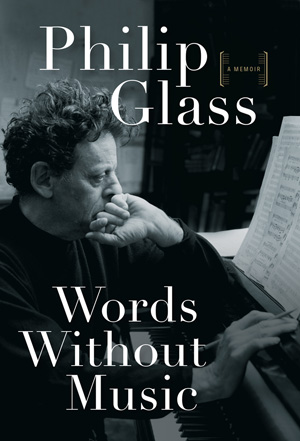Philip Glass has long been considered a formidable voice of the avant-garde in his prolific career as a composer and pianist, but some listeners—both academic and casual—have been slow to embrace his work because of stylistic concerns. Namely, his compositions reflect a pre-eminent occupation—some would even say an obsession—with repetition.Glass’ new memoir Words Without Music craftily juxtaposes the nature of recurrence in music and life with an ongoing study of evolution and forward momentum that tells the musician’s story and lends vitality to his output. Throughout, Glass’ prose is clear, focused and accessible, avoiding the grandiosity sometimes associated with serious art music.This book aims to explore Glass’ intensely varied life and work through a personal lens. Words Without Music emphasizes the broad, divergent influences resulting from a form of minimalism that joyfully reflects the sometimes awkward but always compelling multi-tentacled beast known as musical postmodernism.Glass tells vivid and compelling stories about his life and work. The narrative of his youth in Baltimore is humorously prefaced with warnings his mother offered up about what a life in music might entail. Glass’ Uncle Henry, a gifted drummer, spent much of his life traveling the East Coast from gig to gig. Though forewarned that such a choice might very well lead to poverty or worse, endless summers opening for hapless comedians on the Borscht Belt, Glass admits early on that such possibilities fascinated him. Glass’ initial attempts to find work as a musician in New York City were rebuffed, and he returned to Baltimore and worked a while at Bethlehem Steel. But he was determined not to repeat his uncle’s trajectory into hard work and obscurity. The composer spends a good portion of the book talking about the influence his family had on him, particularly his father Ben, a record salesman. The senior Glass often brought home recordings that did not sell, mostly the work of modernists like Stravinsky and Bartók. Eventually though, Glass came upon the quartets of Schubert and Beethoven, discoveries that ignited his desire to pursue music and led to college and a move to Chicago.Glass continually refers to things he heard growing up, from the Yiddish spoken by close relatives at home to the sound of steel wheels on the tracks from Pennsylvania to the Windy City. He connects all these sonic reminiscences to discoveries he made later in life—the expression of chaos in ordered systems, the cyclical essence of time and time-keeping and the cultural underpinnings that make music so familiar and desirable an experience to humans.With a heady conglomeration of influences, personages and experiences in his ken, it’s no wonder the composer’s career quickly ascended past even his own expectations. Stints at Juilliard and study in Paris with modernist matriarch Nadia Boulanger led to an embrace of playwright Samuel Beckett’s sparse sense of timing, the appropriation of Aaron Copland’s American musical ideas, a fascination with Indian music and ultimately, minimalism and a deep sense of repetition and reiteration as guiding melodic structures.As Glass’ repertoire of compositions and reputation as a maverick grew, so did controversy surrounding his work. He admits there was little tolerance among traditionalists for what he was trying to achieve, but never aims a bitter tone toward those who scoffed at his methodologies, instead choosing to celebrate the opportunities he had to change and influence the world around him.Overall, Words Without Music serves as a bountiful introduction to the realm and practice of modern music and its provocative progeny, as embodied by one of its more succinctly eloquent practitioners. Neither overly technical nor glossily glib, Glass’ memoir will likely lead you to search—with subtle yet repeated abandon—for the Koyaanisqatsi soundtrack you got as a holiday present in the ’80s.
Words Without Music: A Memoir Philip Glass Liverighthardcoverautobiography$29.95

